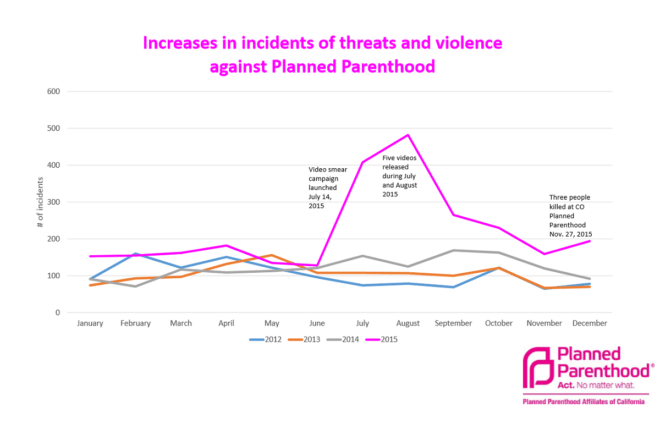California Bill Aimed at Anti-Choice Videos Draws Free Speech Concerns
“We wanted to make sure that we updated ... laws to kind of reflect a changing world and to make sure that we actually protect the doctors who provide these important services to women,” California Assemblymember Jimmy Gomez said, adding that his legislation would also protect patient safety and access to abortion.

A California bill that would make it a crime to distribute secret recordings of health-care providers—like the ones David Daleiden used in his smear campaign against Planned Parenthood—has cleared a legislative hurdle, but faces opposition from media groups and civil liberties advocates, who say the legislation is overly broad.
It is already illegal in California to record, whether in audio or video form, a confidential communication without the consent of all parties involved. But California Assemblymember Jimmy Gomez, who introduced AB 1671, told Rewire that while current law specifically forbids the distribution of illegally recorded telephone calls, there is no similar protection for videos.
“We wanted to make sure that we updated those laws to kind of reflect a changing world and to make sure that we actually protect the doctors who provide these important services to women,” Gomez said, adding that his legislation would also protect patient safety and access to abortion.
AB 1671 makes it a crime if someone who violates California’s existing law against secret recordings “intentionally discloses or distributes, in any manner, in any forum, including, but not limited to, Internet [websites] and social media, or for any purpose, the contents of a confidential communication with a health care provider that is obtained by that person.”
Violators could be jailed for up to a year and fined up to $2,500, penalties similar to those already in place for making illegal recordings. But the new measure specifies that for both recording and distribution, the fines apply to each violation; that means someone like Daleiden, who circulated his videos widely, could quickly rack up heavy fines. Repeat offenders could face fines of up to $10,000 per violation.
The effort to pass the bill comes as abortion providers face a rising tide of threats and secret recordings. Besides Daleiden’s efforts, covertly recorded footage of clinic staff has cropped up in the documentary HUSH and in videos released by the anti-choice group Live Action. Planned Parenthood reported a ninefold increase in harassment at its health centers in July last year, when Daleiden began releasing the deceptively edited videos he claimed showed the organization was illegally profiting from fetal tissue donation. (Multiple federal and state investigations have found no wrongdoing by Planned Parenthood.) The National Abortion Federation recorded an “unprecedented” spike in hate speech and threats against abortion providers last year, peaking with the fatal shooting of three people at a Colorado Springs Planned Parenthood.

“It was so alarming and so extensive that our staff that normally tracks threats and violence against providers could not keep up,” NAF President and CEO Vicki Saporta told Rewire. The organization was forced to hire an outside security firm.
Beth Parker, chief legal counsel for Planned Parenthood Affiliates of California, told Rewire the new legislation is needed to protect the safety of abortion providers.
“If our providers aren’t safe, then they won’t provide, and we won’t have access to reproductive health care,” Parker said in a phone interview.
Daleiden’s group, the Center for Medical Progress, is based in California, and much of his covert recording took place there. Of the four lawsuits he and his group face over the recordings, three have been filed in federal court in California. Yet so far, the only criminal charges against Daleiden have been lodged in Texas, where a grand jury tasked with investigating Planned Parenthood instead indicted Daleiden and fellow anti-choice activist Sandra Merritt for purportedly using fake California driver’s licenses as part of their covert operation. The charges were later dropped for procedural reasons.
Last summer, California Attorney General Kamala Harris announced plans to review whether the Center for Medical Progress violated any laws, and in April, state investigators raided Daleiden’s apartment. Harris has not yet announced any charges. Daleiden has accused officials of seizing privileged information, a claim the attorney general’s office told Rewire it is working on resolving in court.
Harris, meanwhile is running for Senate; her campaign website describes her as “a champion for a woman’s right to choose.”
“We think there is an excellent case and the attorney general should have prosecuted,” Beth Parker of Planned Parenthood Affiliates of California told Rewire. “Daleiden did more than just publish the videos, as we know, I mean he falsified driver’s licenses, he falsified credit cards, he set up a fake company. I mean, we have, as you know, a major civil litigation against him and his conspirators. I just can’t answer to why the attorney general hasn’t prosecuted.”
Parker said AB 1671 could increase incentives for law enforcement to prosecute such cases.
“What we’ve heard as we’ve been working [on] the bill is that criminal law enforcement almost never prosecutes for the violation of illegal recording,” Parker said. “It’s just too small a crime in their view.”
Assemblymember Gomez also said he hopes his bill will facilitate the prosecution of people like Daleiden, and serve as a deterrent against people who want to use illegal recordings to “undermine the fact that people have this right to have control over their bodies.”
“That’s the hope, is that it actually does change that landscape, that DAs will be able to make a better case against individuals who illegally record and distribute,” Gomez said.
Vicki Saporta of the National Abortion Federation says the actions of law enforcement matter when it comes to the safety of abortion providers.
“There’s certainly a correlation between law enforcement’s response to criminal activity aimed at abortion providers and the escalation or de-escalation of that activity,” Saporta said, citing the federal government’s response to the murders of abortion providers in the 1990s, which included the deployment of federal marshals to guard providers and the formation of a task force by then-Attorney General Janet Reno. “We had more than a decade of decreases in extreme violence aimed at abortion providers, and that ended in 2009 with the murder of Dr. [George] Tiller.”
But media and civil liberties groups, including the Electronic Frontier Foundation and American Civil Liberties Union of California, have expressed concerns the bill could sweep up journalists and whistleblowers.
“The passing of this law is meant to chill speech, right, so that’s what they want to do,” Nikki Moore, legal counsel of the California Newspaper Publishers Association, which opposes the legislation, said in an interview with Rewire. In addition to potential criminal penalties, the measure would create new civil liabilities that Moore says could make journalists hesitant to publish sensitive information.
“A news organization is going to look at it and say, ‘Are we going to get sued for this? Well, there’s a potential, so we probably shouldn’t distribute it,’” Moore said.
As an example of the kind of journalism that could be affected by the bill, Moore cited a Los Angeles Times investigation that analyzed and helped debunk Daleiden’s footage.
“Planned Parenthood’s bill would criminalize that behavior, so it’s short-sighted of them if nothing else,” Moore said.
Assemblymember Gomez disagrees about the scope of the bill. “We have tailored it narrowly to basically say it applies to the person who illegally recorded the video and also is distributing that video, so it doesn’t apply to, say, a news agency that actually ends up getting the video,” he said.
Late last week, the California Senate Appropriations Committee released AB 1671 to the state senate floor on a vote of 5 to 2, with Republicans opposing it. The latest version has been amended to remove language that implicated “a person who aids and abets” the distribution of secret recordings, wording civil liberties groups said could be used to sweep in journalists and lawyers. The latest draft also makes an exception for recordings provided solely to law enforcement for investigations.
But the ACLU of California and the California Newspaper Publishers Association said they still oppose the bill. (The Electronic Frontier Foundation said it is still reviewing the changes.)
“The likelihood of a news organization being charged for aiding and abetting is certainly reduced” under the new language, Moore said. But provisions already exist in the California penal code to implicate those accused of aiding and abetting criminal behavior.
“You can imagine scenarios where perhaps the newspaper published it and it’s an anonymous source, and so now they’re aiding and abetting the distribution, and they’re the only person that the prosecutor knows might have been involved,” Moore says.
In letter of opposition sent in June to Assemblymember Gomez, Kevin Baker, legislative director of the ACLU of California, raised concerns about how the measure singles out the communications of health-care providers.
“The same rationale for punishing communications of some preferred professions/industries could as easily be applied to other communications —e.g., by law enforcement, animal testing labs, gun makers, lethal injection drug producers, the petroleum industry, religious sects,” Baker wrote.
Gomez said there could be further changes to the bill as talks aimed at resolving such opposition continue. An earlier version passed the assembly easily by a vote of 52 to 26. The latest draft faces an August 31 deadline to pass the senate and a concurrence vote in the assembly before the end of the session. After that, Gomez said he hopes California Gov. Jerry Brown (D) will sign it.
“If we can strike the right balance [between the rights of privacy and free speech], my hope is that it’s hard for him not to support it,” Gomez said.

